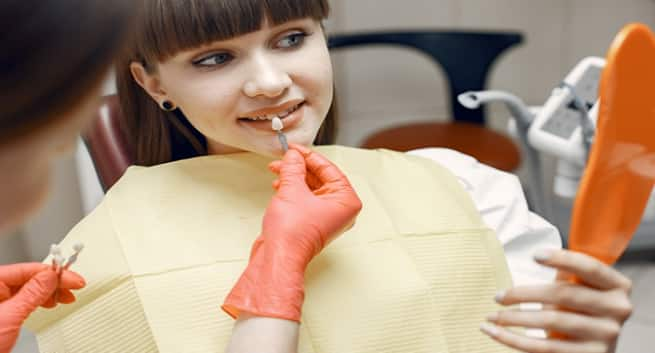
7 Important Facts About Dental Implants You Need To Know. Dental implants are the most widely talked about treatment modality in dentistry nowadays. If you are thinking of getting dental implants for replacing your missing tooth/teeth, there are a lot of things that need to be considered before you take the plunge. First of all, it is important to talk to your dentist to see if dental implants are right for you, as well as be aware of the advantages and disadvantages of getting a dental implant. In this article, Geriatric Dentist and Implantologist Dr. Richa Vats answers 7 important questions related to dental implants that will help you make informed decisions. She specializes in Implantology, Smile Makeover, Laser dentistry, Rotary Endodontics & Geriatric dentistry. Excerpts from the conversation with the HealthSite:
Q 1. What are dental implants?
Dr. Richa: This is perhaps one of the most common and obvious first questions to ask before dental implants. A dental implant isn’t an actual tooth, but a prosthesis used for replacing missing teeth. Basically, it’s a small titanium fixture the dentist inserts into your jawbone, on top of which the dentist can attach a tooth. This process is done surgically. Implants serve as your missing teeth’s roots. Since dental implants fuse with your jawbone, they won’t make noise, slip or cause bone damage like dentures or fixed bridgework may.
Q 2. Are dental implants safe?
Dr. Richa: A dental implant cannot harm the body adversely. The implant is completely submerged in the bone so you don’t feel any foreign body sensation or irritation. Since it is made with titanium alloy it doesn’t feel heavy either.
Q 3. How painful are dental implants?
Dr. Richa: While discomfort can vary between people, most individuals report getting their dental implant was much less uncomfortable than they anticipated it to be. During the surgical dental implant procedure, the dentist will give you an anesthetic, so you should feel minimal discomfort if any.
If you follow the dentist’s post-operative instructions and take the prescribed antibiotics, you should experience minimal discomfort. Your dentist will likely prescribe you pain medication as well.
Q 4. What if my body rejects an implant?
Dr. Richa: Very rarely does an individual’s body reject an implant. The very few rejections are due to rare allergies to the titanium alloy that make up the implant. In this case, your dentist will pull out the implant, allow the bone to heal, and re-insert a new implant.
Another reason why an implant could fail is if you don’t take proper care of it after your surgery. Without excellent oral hygiene, natural teeth fail and fall out eventually. Dental implants are no different. When you take good care of your teeth and your implants, it will help prevent gum decay and structure failure later on.
Similar to any oral surgical procedure, there is a chance of infection, pain, and inflammation. However, negative effects are rare and usually minor if they do occur.
Q 5. What are the indications and contraindications for implants?
Dr. Richa: To be a good candidate for implants, you need to have good oral and general health. You also need to have adequate bone in your jaw to support the dental implant, be free of periodontal disease, and have healthy gum tissues.
In general, you may be a good candidate for dental implants if you:
– Have one or more teeth missing
– Have enough bone for securing the dental implant or can have a bone graft
– Have a fully grown jawbone
– Have healthy oral tissues
– An existing denture wearer (It might be possible for your dentist to place the implants beneath existing dentures to help stabilize and support them. However, the dentist can only do this if your existing dentures are in excellent condition.)
– Don’t smoke or be willing to quit.
– Absolute contraindications to implant rehabilitation include recent myocardial infarction and cerebrovascular accident, and valvular prosthesis surgery. Patients on hormonal therapy like uncontrolled diabetes.
– Immunosuppression, bleeding issues, osteoporosis, active treatment of malignancy, drug abuse, psychiatric illness, as well as intravenous bisphosphonate use.
– Relative contraindications will include tobacco addiction, inadequate bone support which cannot be augmented, controlled metabolic disorders. Patients with poor oral hygiene and non-compliant patients.
Q 6. How long does it take for dental implants to heal? And can I get teeth right after?
Dr. Richa: The average implant process occurs in multiple steps. You may require more than one healing stage. So, there’s a varied healing period, depending on your health, the number of teeth to be replaced, and other factors. However, the healing process generally takes anywhere from 12 to 16 weeks.
Placing teeth right after the surgery isn’t uncommon but can’t be done for everyone. A lot of factors are to be considered before making this decision. Also, this is to be pre-planned before the surgery.
Q 7. How long do implants last?
Dr. Richa: Dental implants can last a lifetime if you take care of them properly by regularly brushing, flossing and following your dentist’s recommendations. While no one can guarantee the lifetime success of an implant, you can be provided with suggestions and guidelines on how to take good care of your teeth. The guidelines are based on your genetic history, proper hygiene procedures, and your nutritional habits.
Also, you can expect some bone loss around your implant over a few years which may or may not affect the stability of your implant. So, basically they are a permanent solution for your missing teeth.
Dr. Richa Vats is a Consultant Prosthodontist at Sense of Smile Dental Clinic, Dental Life Forsan and I Trust dental (Noida), Dr.Talwars Multispeciality Clinic, New Delhi, Jaypee hospital, Noida, Aakash hospital, Malviya Nagar. She has her personal setup at Aashlok hospital, Safdarjung Enclave, New Delhi, India.
This post first appeared on The Health Site






